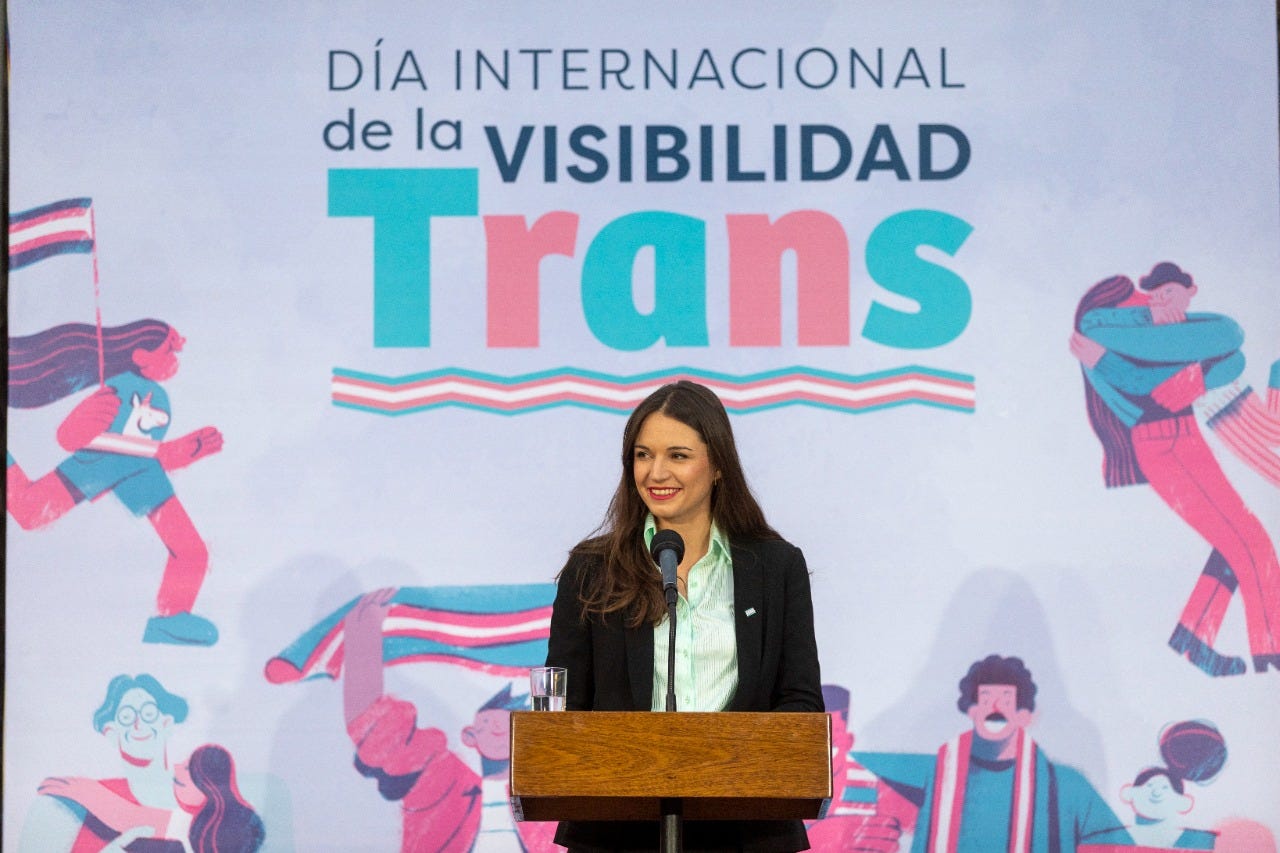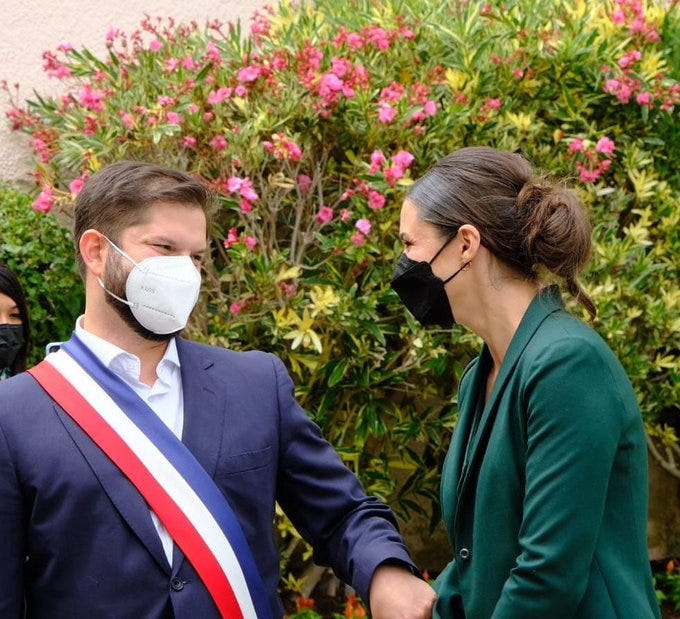Chile’s ‘first lady’ is asking tough but the right questions about her own gendered role, and other stories
#WomenLead (Issue 125): Your weekly round-up on women in politics
Hello, and welcome to Issue 125!
Our edition today brings you updates from Bahrain, Spain and the United Kingdom, and the spotlight is on a political office that is rarely discussed or debated for its gendered nature: the role of the “first lady”. We bring the debate to you straight from the epicentre of the conversation - Chile.
In case you missed last week’s edition, you can read it here.
Quick Updates
⏩ MOVING FORWARD: Bahrain will now have eight women in its 40-member Parliament, which is a historic high, AFP reported. The outgoing chamber had six women, and a record 73 women contested the polls this time.
😡 WATCH YOUR WORDS: Lee Waters, a member of the Welsh Parliament, defended himself against criticism by a female colleague by calling her comments “hysterical”. On the bright side, his comments didn’t go unnoticed. The MP at the receiving end of Waters’ sexist comments, Natasha Asghar, gave him the benefit of doubt, and said while he may have used the word naively, she did not expect to “hear it again”.
Presiding officer Elin Jones was more direct - calling the word inappropriate, she pointed out that there was a long history of the term "being used by men to demean women". Waters later apologised for his comments.
🤮 SIMPLY DISGUSTING: In Spain, the “only yes means yes” consent law is under the spotlight. The law was brought in to make consent the key factor in determining sexual assault, but it is facing criticism since it has also revised the punishment, making it possible for some convicts to serve shorter sentences.
Amidst all this debate, opposition parties have decided to go all creepy. They decided to launch disgusting personal attacks on Irene Montero (the equality minister who championed the law), with one politician going as far as to say that she had got where she was “because of being impregnated by an alpha male”. The comments have been criticised and the party concerned has distanced itself from the same. But excuse us, sirs, just what kind of discourse is this?
Spotlight: CHILE 🇨🇱🇨🇱🇨🇱
Irina Karamanos has a job she’d rather not have. She is the partner of Chile’s President Gabriel Boric, and has been a reluctant “first lady” from the word go. Going by media reportage, she wants to end this role for good.

If you’re wondering why, here’s the short answer — the role makes no sense in a modern democracy.
Let us explain that a little.
First up, the role has typically assumed the President to be a man in a heterosexual marital relationship. Whenever the President is not a man, or if the man is in a relationship with a woman but not married to her, or if the President is homosexual, we see disproportionate attention, even discomfort, about the right role, title and official conduct for their partner. (Treat your eyes with some really absurd headlines and updates here, here, here and here).
Second, the role is not based on merit but on simple association with an elected leader. That makes little sense in a democracy.
Third, first ladies, typically wives of presidents, are expected to take their roles of wives and all the labour that comes with it to the Presidential palace. As Kate Cohen writes in The Washington Post:
“[The First Lady’s] responsibilities are somewhat hazy, defined not by statute but by a tradition that dates from Dolley Madison, who, though she was the fourth president’s wife, was the first to do first-lady types of things. Those are essentially a dolled-up package of what sociologists now call ‘invisible labor’ — the work it takes to keep a household going, usually unrecognized and always uncompensated.”
The role has been popularised by American politics (where not a single woman has become President yet #who’ssurprised?), but has been adopted in several other nations too.
In Chile, first ladies are expected to head a set of social organisations.
For Karamanos and Boric, committed to feminist and left politics, the role simply cannot make sense. Karamanos had indicated even before Boric’s election that she might not take up the role of a first lady if he won.
“It is a position that deserves to be rethought because we are in different times, a lot of things have changed and you have to rethink power and the relationships that emerge from it,” she had said at the time explaining her disinterest in the position.
Boric, too, was clear in his disapproval of the position. “There can be no positions in the State that have to do with or are related to the relationship of the President…We must create an instance that is transparent, depending on merits and of civil service careers, and not of blood ties or affinity with the President,” he explained.

However, the pre-election idealism on the front did not translate to action. After Boric was officially sworn in as President in March this year, Karamanos went ahead and took up the role, though reluctantly.
Explaining her decision, she said:
“I want to announce that after several weeks of design, we have decided to assume the role traditionally called the first lady with the commitment to reformulate it.”
But this divided feminists who were unhappy that Karamanos had given in and taken up an anachronistic role. While some were optimistic that she might be able to reform the role, others were clear in their disappointment – “[W]hat I question is the continuation of a profoundly chauvinist position in which women are relegated to a secondary role,” Priscila Gonzales of the Chilean Network Against Violence Against Women told new agency AFP.
Karamanos’ initial attempts to reform the position backfired. What used to be called the ‘First Lady’s cabinet’ was changed to ‘Irina Karamanos’ cabinet’ in June, a move that invited widespread criticism. Karamanos apologised and said it was an administrative error, and later the government announced that the first lady would henceforth be called the “sociocultural coordinator of the republic’s presidency”.
She has since been working to overhaul the position. In October, she announced that the institutional role of the first lady as people have known so far would “now end”.

In recent months, Karamanos has been working to move the work of running six foundations that oversee programmes such as a children’s day care network, a science museum and a women’s development organisation to the relevant ministries, The Washington Post has reported.
“The partner of the president is chosen to be a partner…not to be a president of foundations,” Karamanos explained to a board as she made a case for detaching their foundation - a science museum - from the first lady’s office, an explanation that helped her get the board’s approval.
But not everybody (read, the conservatives and patriarchs) is impressed. Some feel that if she didn’t want the role, she shouldn’t have chosen to be the partner of a presidential candidate (uhhhh….whaat??). Others think this is a disaster and that she is “degrading” the role of the first lady.
Karamanos has even been asked by women on the streets to “take care” of the President, The Washington Post report said.
“Of course I take care of him. But what if I didn’t, you know? What would happen? Can this man not be president, can he not be self-sufficient?” Karamanos wondered, and on that we echo her thoughts exactly.
We’ll be keeping an eye out on how this attempt to overhaul this position plays out, but we are glad to see an attempt to rethink the position. What are your thoughts on this? Does your country have these kinds of gendered roles and expectations from the President/PM’s partner? Let us know! We’d love to know more!
Reflections & Reads
“How Pakistan emerged as a climate champion” - The Economist on the country’s climate change minister, Sherry Rehman, who it says “was one of the star turns at the UN climate talks held in Sharm el-Sheikh last week”.
Read/watch to know more about Sushma Andhare, who The Quint thinks is a “rising star” in India’s regional party - the Shiv Sena.
That’s a wrap for this week! Liked this edition? Then press the ❤️ button and show us some love! And please, please do share this with a friend or on your social media accounts. There’s frankly nothing quite like reader love and endorsement, so please keep it coming! We’ll see you next weekend with Issue 126!



